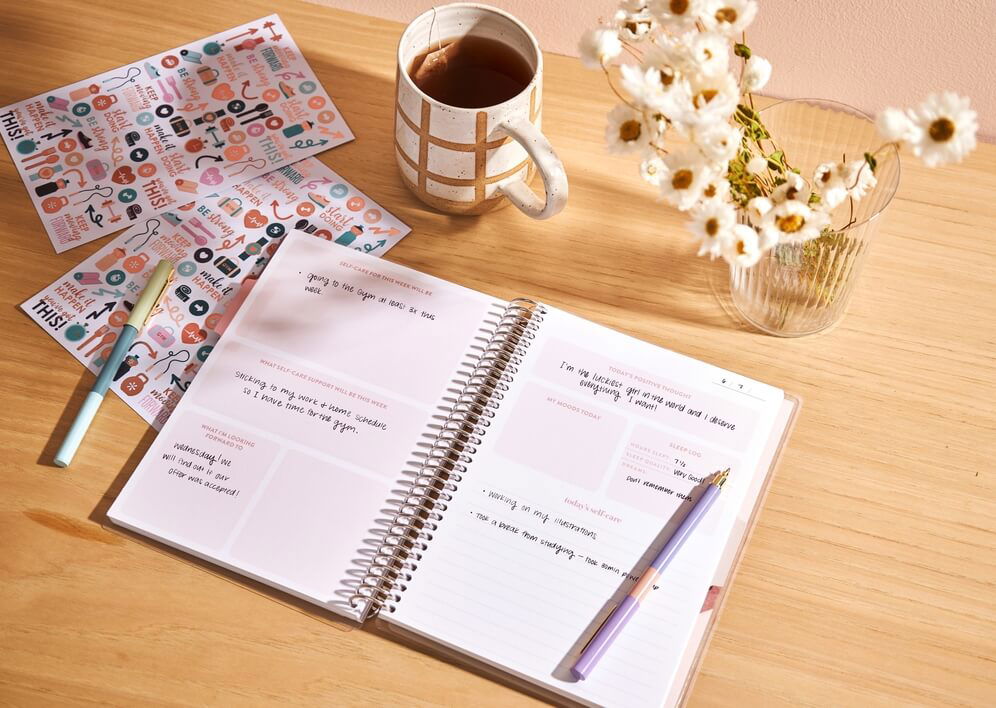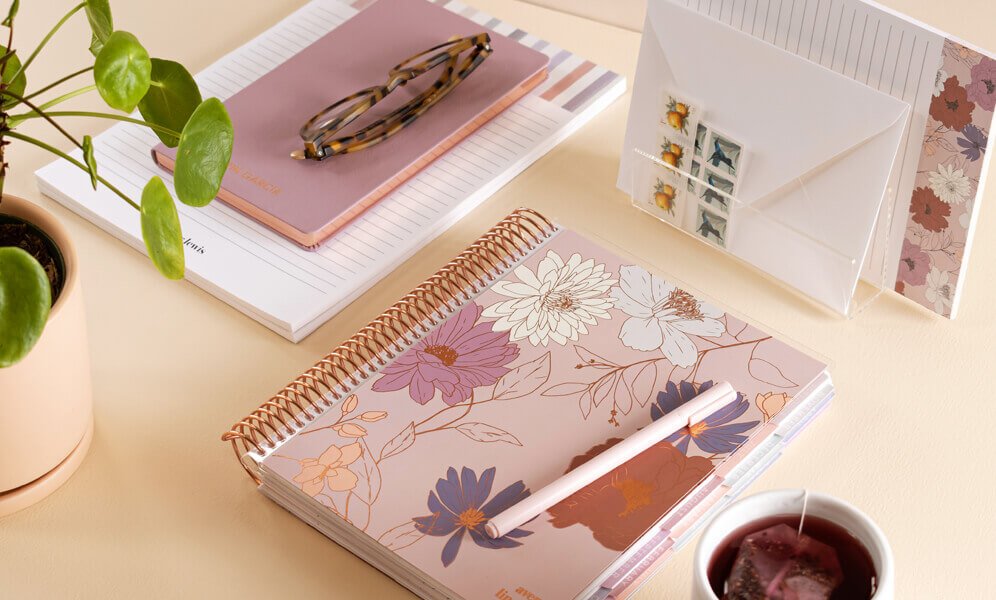How to Start Mindfulness Journaling + Why You Should

If the daily grind is wearing you down and these uncertain times are winding you up, mindfulness journaling may be a smart, simple way to help you unplug, slow down, and create a sense of calm and clarity amid the chaos.
With everything going on in the world, it's easy to become exhausted, strained, and stressed, physically, emotionally, and mentally. Most of us are living busy (too busy) lives, working too much, and becoming more and more disconnected – from each other and from ourselves. How often do we get the chance to unplug and get still enough to reflect on our thoughts and emotions without being disrupted constantly? Exactly. That’s where mindfulness journaling comes in.
It’s a lowkey, budget-friendly, easy way to quiet the noise, prioritize self-care, reduce stress, and develop a healthier lifestyle.
In this article, we'll delve deeper into what mindfulness is, what mindfulness journaling is, the benefits of journaling for mindfulness, how to practice mindful journaling, what to write in a mindfulness journal, how to start a mindfulness journal, and daily mindful journal prompts to inspire you.
Table of Contents
What Is Mindfulness?
Mindfulness is the practice of being present in the moment, aware of your thoughts, feelings, and surroundings without judgment. It's about observing your experiences without trying to change or control them. Mindfulness is a powerful tool for self-care, personal growth, mental health, and overall well-being. When you practice mindfulness, you develop greater self-awareness, emotional regulation, and empathy.
What Is Mindfulness Journaling?
Mindfulness journaling is the act of writing down your thoughts, feelings, and experiences in a non-judgmental way. It's a way to connect with your inner self, deepen your awareness, and cultivate a sense of inner peace. Unlike other popular forms of journaling – like fitness journaling, bullet journaling, food journaling, and more – it’s a specific type of journaling practice that focuses on being present and grounded in the moment. It’s a great way to observe your thoughts, feelings, and emotions without criticism, filters, or fear. In that way, it’s rather freeing (and can be downright therapeutic!).

The Benefits of Journaling for Mindfulness
There are numerous benefits of journaling for mindfulness, including:
Increased self-awareness
Mindfulness journaling helps you become more aware of your thoughts, emotions, and behaviors. By reflecting on your experiences, you can gain insight into your patterns and triggers.
Improved emotional regulation
Writing down your thoughts and emotions can help you process and regulate them more effectively. This can lead to greater emotional stability and resilience.
Reduced stress and anxiety
Mindfulness journaling can be a form of self-care that helps you reduce stress and anxiety. It provides a safe space to express your feelings and concerns without fear of judgment.
Increased creativity
Journaling can also stimulate creativity and help you generate new ideas.
Improved problem-solving skills
When you write down your thoughts and feelings, you can gain perspective on difficult situations and find solutions to problems.
Increased self-esteem
Mindfulness journaling can help you develop a more positive self-image and increase your self-esteem.
Consider using prompted journals like our Daily Wellness Planner seen on Today.com.
How to Practice Mindful Journaling
To practice mindful journaling, follow these steps:
- 1. Find a quiet and comfortable space where you won't be interrupted.
- 2. Set an intention for your journaling practice. This could be to increase your self-awareness, manage stress, or cultivate gratitude.
- 3. Take a few deep breaths to center yourself and calm your mind.
- 4. Start writing without judgment or censorship. Let your thoughts and emotions flow freely onto the page.
- 5. Reflect on your writing and observe any patterns or insights that emerge.
What to Write in a Mindfulness Journal?

You can write about anything in your mindfulness journal. It’s a powerful tool for personal growth, mental health, and overall well-being. And by taking the time to reflect on our thoughts and experiences in a non-judgmental way, we can cultivate greater self-awareness, emotional regulation, and empathy. Here are six mindful journaling ideas to get you writing:
Gratitude
Write down things you're grateful for, such as moments of joy, acts of kindness, or experiences that made you feel happy and content.
Self-reflection
Reflect on your thoughts and emotions, and explore your beliefs, values, and goals.
Mindfulness practices
Write about your experiences with mindfulness meditation, breathing exercises, or other mindfulness practices.
Faith and spiritual practice
If you’re a spiritual person, faith journaling, prayer journaling, reflecting on spiritual texts, and more can be wonderful for furthering your spiritual journey.
Creative writing
Use your journal as a space to explore your creativity through poetry, storytelling, or other forms of writing, like dream journaling.
Positive affirmations
Write down positive affirmations that remind you of your strengths, values, and goals.
Challenges and obstacles
Write about challenges or obstacles you've faced, and how you've overcome them. This can help you gain perspective and cultivate resilience.
Daily intentions
Each morning, jot down what kind of day you want to have (visualizing it helps!), what you want to focus on, what you want to accomplish, and why it’s important to you. If you need a little guidance on this one, try a daily intention journal.
How to Start a Mindfulness Journal

Starting a mindfulness journal can be as easy as you want it to be. Remember that your journal is your personal space, and there is no right or wrong way to write in it. The most important thing is to be present in the moment, observe your thoughts and emotions without judgment, and write from your heart. By incorporating mindfulness journaling into your daily routine, you can improve your mental and emotional health, increase your self-awareness, and develop greater compassion for yourself and others. So, here are four, easy-to-follow steps for starting your mindfulness journal:
Choose a journal that speaks to you. It could be a simple notebook, a fancy leather-bound journal, or you can journal the note pages in your planner.
Carve out time in your schedule.
Set aside a regular time for journaling each day. This could be first thing in the morning, during your lunch break, or before bed.
Be intentional.
Decide on your intention for your journaling practice. What do you want to gain from it? This could be anything from increased self-awareness to stress reduction.
Don't limit yourself.
Start writing without judgment or censorship. Write whatever comes to mind. Don't worry about grammar, spelling, or punctuation. This is your space to be free and creative.
Daily Mindful Journal Prompts to Inspire You

If you're struggling to get started with mindfulness journaling, you may want to consider guided journals with built-in prompts for specific topics like gratitude, self-care, wellness, faith, and more. For blank journals and notebooks, here are some daily mindful journal prompts to inspire you:
- What am I grateful for today? Write down at least three things you're grateful for, big or small.
- What emotions am I feeling right now? Reflect on your current emotional state. Are you feeling happy, sad, anxious, or angry? Write about why you feel this way.
- What self-care practices can I incorporate into my daily life? Write down at least three self-care practices that you can do each day to take care of yourself.
- What was a challenging situation I faced today? Reflect on a difficult situation you faced and write about how you handled it. What did you learn from the experience?
- How can I bring more mindfulness into my daily life? Write about ways you can practice mindfulness in your daily life, whether it's through mindful eating, meditation, or simply paying attention to your surroundings.
- What is a limiting belief I hold about myself, and how can I challenge it? Write about a belief you hold about yourself that may be holding you back. How can you challenge this belief and reframe it in a positive way?
- What are some small acts of kindness I can do for others today? Write down at least three small acts of kindness you can do for others, whether it's through a kind word or gesture.
- What did I learn about myself through my mindfulness practice today? Reflect on your mindfulness practice and write about what you learned about yourself, your thoughts, and your emotions.
- What are three things I love about myself? Write down three things you love about yourself, whether it's a personality trait, a physical attribute, or a skill you possess.
- How can I prioritize self-compassion and self-care in my daily life? Write about ways you can prioritize self-compassion and self-care in your daily life, whether it's through mindfulness practices, self-care activities, or other forms of self-love.

Whether you're new to mindfulness or an experienced practitioner, starting a mindfulness journal can be a transformative practice. Use the tips and prompts we went over to get started on your own mindfulness journaling journey, and discover the benefits for yourself. With practice, you can develop a greater sense of presence in the moment and improve your daily life.
Explore our full line of journaling best sellers and start writing today!
Related Journaling Guides
You may also enjoy these other popular, guided journaling tips, prompts, and inspiration from our experts:
- What Is a Sleep Diary? Plus, How to Fill It In
- Journaling for Mental Health + Where to Start
- The Benefits of a Stress Relief Journal + How to Start One
- Exploring Faith Through Journaling: How to Start a Faith Journal
- How to Start a Gratitude Journal and Unlock the Power of Positivity
- 8 Life-Changing Benefits of Journaling Before Bed + How to Start
- Journaling for Anxiety: How to Start
- 11 Breakup Journal Prompts to Overcome Heartbreak
- Meditation Journaling: Elevate Your Practice with Daily Reflections
- How to Do a Daily Gratitude Challenge + Why You Should
- How to Use a Line a Week Journal: A Comprehensive Guide + Prompts
- 20 New Year Writing Prompts for Goal Setting + Personal Growth
- 10 Creative Weight Loss Journal Ideas